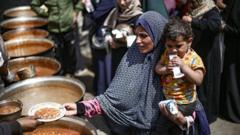As Omri Miran marks his 48th birthday in captivity, his wife Lishay continues to send heartfelt WhatsApp messages, sharing milestones and emotions from their family life over the past 18 months. The ongoing conflict and the uncertainty surrounding his fate amplify their pain, yet Lishay remains resolute in her belief that he will return.
A Wife's Hope Amid Uncertainty: Waiting for News from an Israeli Hostage

A Wife's Hope Amid Uncertainty: Waiting for News from an Israeli Hostage
Omri Miran, captured by Hamas 18 months ago, remains a beacon of hope for his wife and daughters, as they navigate life without him while holding on to messages of love.
As Omri Miran turns 48 in captivity, his wife, Lishay, grapples with the emotional tide of uncertainty and hope as they mark another painful milestone apart. For 18 months, since Hamas militants abducted him from their home in Kibbutz Nahal Oz, she has dedicated herself to keeping their connection alive through messages sent via WhatsApp.
Three weeks post-abduction, Lishay began sharing snippets of family life in a chat she aptly titled Notes to Omri. The messages range from daily updates about their daughters and heartfelt reflections to reminders of the vast support from friends and strangers alike. One touching note from late October reflects her deep yearning, as she writes how their eldest daughter, Roni, continues to miss her father and struggles without his presence.
This past Friday marked Omri's birthday—his second spent in captivity. As messages remained unsent in his inbox, Lishay embraced the bittersweet reality of family life moving on without him. She reflected on the significance of the upcoming Passover holiday—a time symbolizing freedom—contrasting it with her own feeling of entrapment, as she expressed to a gathering at Hostages Square in Tel Aviv.
While posters in the square call for his release, with his age updated from 46 to 48 by his father, the atmosphere is one of communal resilience. Families light candles and prepare for symbolic Seders in remembrance of the hostages still held in Gaza, as tension looms over news of the renewed conflict.
Lishay often returns to their hometown, a distance of only 700 meters from the Gaza border, seeking solace in a place that still feels connected to Omri. However, her journey is also filled with fear, especially as the sounds of war begin to resonate once more in the region and hopeful whispers of ceasefires fade into uncertainty.
Although she refrains from criticizing the Israeli government, Lishay expresses frustration over the lack of urgency regarding her husband’s release as the focus shifts to other hostages. In a poignant remark, she emphasizes that Omri is more than just another name on a list—he is a beloved husband and father.
As Lishay’s unwavering faith for Omri’s return continues to drive her, she checks her phone for the elusive blue ticks that would signify a connection once more. Despite the odds, she remains convinced that one day her intimate messages of love and family life will finally reach him.



















